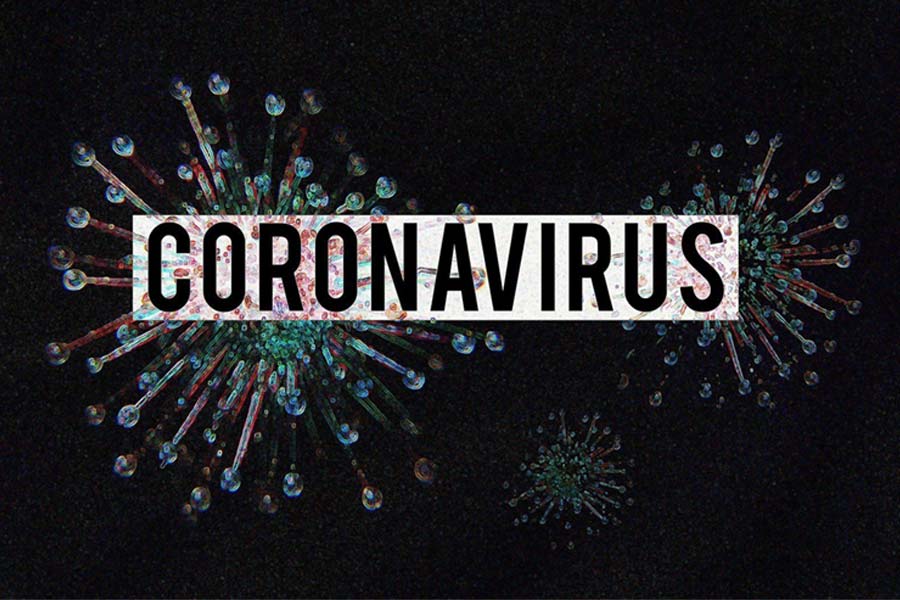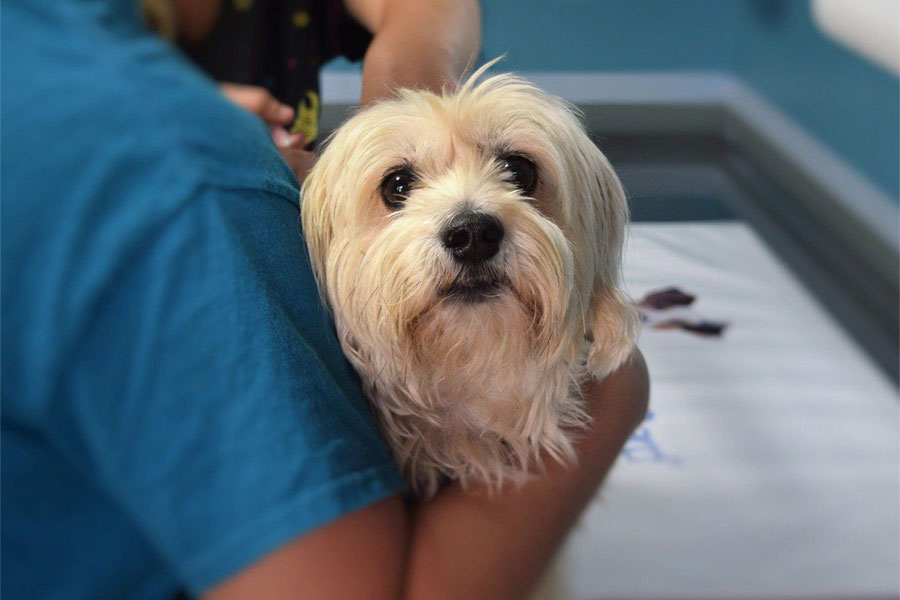How Does COVID-19 Affect Pets? (Updated April 8/20)
The COVID-19 pandemic is an unprecedented event that has raised many questions for ourselves and for our pets. The health of our clients and their pets is of the utmost importance to us. We would like to take this time to help answer any questions you may have about the coronavirus with the information that we have so far.

What is a Coronavirus?
Coronaviruses are a family of viruses that have been around for a long time. They can infect humans and numerous species of animals. The virus that is responsible for the current pandemic is a new or “novel” coronavirus that has been identified by the name SARS-CoV-2. The origin of this new virus is not known for sure but it is suspected that it originated at an open food market in Wuhan, China. Since this new coronavirus closely resembles another virus that infects bats, a link to bats being the source is being investigated. It is also believed that the virus needs to pass through another animal as an intermediate host before it infects humans. Many species of animals have been tested to help identify which animals may pose a risk, but initial information is pointing to a Pangolin, or scaly anteater. Pangolins are traded in China as they are considered a delicacy and their scales are believed to have medicinal properties. Studies are still in the early stages, so these links are suspected but not yet confirmed.
What is Covid-19?
COVID-19 stands for “Coronavirus disease 2019” and is being used to describe the disease process caused by the new SARS-CoV-2 virus. This disease is a contagious respiratory illness that causes flu-like symptoms like fever, dry cough and difficulty breathing. So far, it has only been identified in humans. Symptoms can range from mild to severe and it appears to be most severe in people with pre-existing health conditions, weak immune function and people aged 65 and over. COVID-19 is transmitted through respiratory excretions from an infected person who is shedding the virus. The virus appears to be highly contagious, so it can be passed on by respiratory secretions from a person harbouring the virus or contact with the environment that was contaminated by an infected person.
Are There Any Cases of Animals Becoming Infected?
The answer to this question is still being investigated, but I can provide the details of what is known so far. There is one case of a dog in Hong Kong that tested positive for the SARS-CoV-2 virus. The owner of the dog tested positive for COVID-19 and as a result, two dogs in the home were tested. One of the dogs had a weak positive test for the virus and has since been tested two more times. All three tests have come back as weak positives. The tests were oral and nasal swabs that identified genetic material from the virus. Despite the positive tests, the dog has not shown any clinical signs of illness. Authorities initially believed that this could have been a case of human-to-animal transmission, but they could not confirm it with the preliminary results. Since those initial tests were run, a new blood test was performed on the same dog, looking for antibodies to the virus. If an animal becomes infected with a virus, it should mount an immune response and make antibodies against that virus. It is interesting to note that the blood test came back negative. Authorities are now saying further investigation is required to confirm if the dog was indeed infected. It remains in quarantine and will stay there until it is considered free of the virus.
Update (April 8/20)
- The dog in Hong Kong that tested positive for the virus did eventually test positive on a blood test for antibodies against the virus. Health authorities believe that this evidence supports human-to-animal transmission, but the dog never showed any clinical signs of disease while in quarantine. It was eventually released back to the owner after testing showed it was free of the virus. The dog subsequently passed away at home three days later. It is very unlikely COVID-19 played any part in the death of the dog as it was 17 years of age and had other ongoing health issues.
- A German Shepherd dog in Hong Kong was reported as testing positive on March 18th. The owner of the dog was positive for COVID-19 and two pet dogs in the house were tested. Only the German Shepherd tested positive. The dog has not shown any clinical signs and remains in quarantine until testing confirms it is no longer positive for the virus.
- At the end of March a cat in Hong Kong living with a COVID-19 positive owner tested positive twice for SARS-CoV-2 from swab tests. The cat is showing no clinical signs but remains in quarantine until it is determined to be free of the virus.
- Hong Kong’s Agricultural, Fisheries and Conservation Department (AFCD) has reported testing 17 other dogs and 8 cats from homes with COVID-19 positive human cases. The only positive results have been the 3 cases listed above.
- Outside of China, there have also been some new reports. A cat in Belgium presented to a Veterinary College with respiratory and digestive issues after it’s owner tested positive for COVID-19. SARS-CoV-2 was detected in samples from the sick cat. There is no direct link showing that the Coronavirus caused the cat’s symptoms and authorities cannot conclusively say the cat was infected with COVID-19 because of the way the samples were obtained. The cat subsequently recovered from the illness.
- The only other positive case that has been reported in animals is a Tiger at the Bronx Zoo. Multiple big cats in the same exhibit showed signs of respiratory illness. As a result, one of the tigers was tested and found to be positive for the virus. Health authorities believe that the cats came into contact with the virus through an asymptomatic zoo keeper. All the big cats are in isolation and it is believed they will all recover. No other animals at the zoo are symptomatic.

Are My Pets At Risk Of Becoming Sick With COVID-19 Or Making Me Sick?
The short answer to this question is “No”. The most recent information shows no evidence that your pet can get sick from COVID-19 or that the virus originated in a dog, cat or domesticated pet. These are early days and we will update you if that statement changes, but for now we have not seen any cases of animals becoming sick or owners catching the virus from their pet.
Update (April 8/20)
- The case of the tigers and lions at the Bronx Zoo with clinical signs indicate animals may be able to become sick from the new coronavirus. Only one of the tigers was tested and did test positive for SARS-CoV-2.
- We have inconclusive evidence in regards to the cat from Belgium, so we cannot say that the symptoms the cat exhibited were due to COVID-19.
- More information is required to definitively say that our pets can become sick with COVID-19. Despite this the risk of transmission from humans to pets still appears to be low.
Conclusions On COVID-19 And Pets
The information that has been gathered so far has resulted in some recommendations for pet owners. The American Veterinary Medical Association released the following statement:
“Although there have not been reports of pets or other animals becoming sick with COVID-19, it is still recommended that people sick with COVID-19 limit contact with animals until more information is known about the virus. So, if you are ill with COVID-19, have another member of your household take care of walking, feeding, and playing with your pet. If you have a service animal or you must care for your pet, then wear a face mask; don’t share food, kiss, or hug them; and wash your hands before and after any contact with your pet or service animal. You should not share dishes, drinking glasses, cups, eating utensils, towels, or bedding with other people or pets in your home. While we are recommending these as good practices, it is important to remember there is currently no evidence that pets can spread COVID-19 to other animals, including people.”
People who have tested positive must also remember that there is initial evidence to support human-to-animal transmission. This means that although your pet may not get sick with the virus, it may become a carrier of it. Thus, it has the potential to “carry” the virus to other people. Following the above recommendations should help prevent your pet from becoming an unknowing participant in passing the virus on.
Update (April 8/30): In Conclusion
- More information on how COVID-19 can affect our domestic pets is slowly becoming available.
- The data suggests that transmission of the virus from humans-to-animals is possible, but not likely.
- Cats may be at a higher risk than dogs.
- There are still no known cases of animal-to-human transmission. When you compare the number of human cases to the number of reported animal cases, it appears that the risk of human-to-animal transmission is low.
- Despite the new information, recommendations regarding COVID-19 and pets remains the same. People who are positive for COVID-19 need to treat their pets as they would other family members and restrict contact with them to help reduce any possible spread of the disease (see above recommendations from AVMA).

Pet Health Care During The Outbreak
Properties Animal Clinic is committed to providing pet health care services during the outbreak. We remain open to the public, but have implemented extra safety measures to avoid potential spread of infection. We have increased disinfection protocols and we are scheduling appointments in a way that helps reduce exposure of staff and clients. We are asking individuals that are self-isolating because they are ill, travelled recently or been in contact with someone who has COVID-19 to stay-home and reschedule non-urgent appointments. If you have been in contact with someone withCOVID-19 or are sick yourselfand your pet needs urgent veterinary care we ask that youcall usso that we can arrange appropriate health care for your pet while still following the recommended safety measures outlined by public health authorities.
Hopefully this information helps you to understand how COVID-19 can affect pets and owners. The good news is that initial reports indicate it is very unlikely your pet will become sick or be a source of infection for you. The only source of infection that has been documented so far is from person to person or contact with something contaminated by an infected person. We hope you are all staying safe and remember to take advantage of this time to care for yourselves, your families and your pets.
References:
- AVMA website: https://www.avma.org/resources-tools/one-health/covid-19
- Alberta Veterinary Medical Association website:https://www.abvma.ca/site/public/covid19?nav=mainsidebar